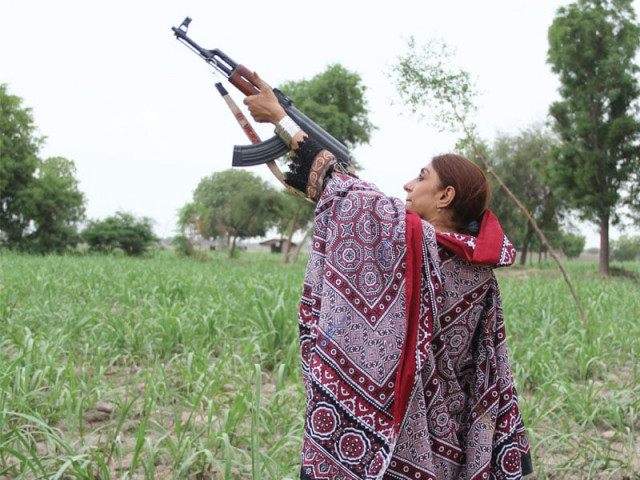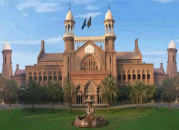Meet Nazo Dharejo: The toughest woman in Sindh
In past two decades, she has battled dacoits, has fought off several attempts to grab her agricultural land.

Meet Nazo Dharejo: The toughest woman in Sindh
That man was PPP MPA Jam Tamachi Unar, who also heads the public accounts committee of the Sindh Assembly. Armed with copies of the Holy Quran, they — along with Unar’s own cousin — pleaded with the legislator to relent. They even approached Faryal Talpur, a member of the National Assembly and President Asif Ali Zardari’s sister, but only received empty verbal assurances for their efforts.
But a few days later, when the media arrived at the scene, they saw that the blockage has been breached in not one, but five places by the angry villagers who had finally taken matters into their own hands.
Despite his political clout, Unar was unable to find even a single witness to testify against the person who had led the villagers in their act of defiance.
That person was no influential politician or bureaucrat with the power of state machinery behind them, but rather a woman called Nazo Dharejo. When the villagers seemed about to buckle under the pressure of defying powerful local notables, she told them: “If there are bullets fired, I’ll take the first one. If they arrest us, I’ll be the first to offer myself.”
At 36, Nazo Dharejo is already a bit of a local legend. In the past two decades, she has battled dacoits and has personally fought off several attempts to grab her agricultural land — often armed with just a single Kalashnikov — while also managing to raise four children and ensuring that her lands remain productive and profitable.
Nazo Dharejo was the first of three daughters born to Haji Khuda Buksh Khan Dharejo and his second wife, Waderi Jamzadi, in a haveli in Dedhan village, Qazi Ahmed. As was typical for girls in her family, Nazo only studied until the second grade, while also learning to read the Holy Quran in a mosque on the insistence of her mother.
“My mother didn’t know how to read properly,” Nazo says. “But she stressed that I should read the Holy Quran.”
While this rudimentary education was considered enough for most girls, Nazo wanted to study further. “I didn’t care for village life and really wanted to study,” she says repeatedly. “I wanted to tour other countries and to learn about the world.” Though the little village of Qazi Ahmed offered no such opportunities, Nazo quickly found a way to get what she wanted.
“I had a sister-in-law who spoke Urdu and I got her to teach me. I would read whatever came my way, including digests,” she says proudly.
When Nazo’s younger sisters were sent to school, another opportunity emerged. Having mastered Urdu, Nazo decided she also wanted to learn English — “I didn’t even know the alphabet!” — from a tutor who lived in the autaq (compound). Nazo asked her father for permission for the tutor — who schooled her younger sisters — to teach her as well. Haji Khuda Baksh, who was certainly not the stereotypical chauvinist, agreed to her request.
His own father, the elder Dharejo, had married four women. As a result, members of the extended family were perpetually at odds with each other and fights over land were common. Haji Khuda Baksh himself was unable to visit one tract for eight years because of threats to his life.
Growing up, Haji Khuda Baksh never got along with his father because he hadn’t treated his many wives and children equally and would favour some over others.
Perhaps, Nazo says, this was the reason that he sought to do the exact opposite with his own family. Khuda Baksh offered his daughters not just the opportunity to gain an education but also a chance to live a life as equal citizens of society. “We were allowed to go to Nawabshah for shopping,” she says, recalling her life with her younger sisters. When the girls requested that they wanted to see a film in the cinema, he would book a box just for them.
“He gave a lot of respect to his children,” recalls Nazo. “When he came back from the field, he wouldn’t let me touch or pick up his shoes.”
But more importantly, Khuda Baksh never let his daughters feel like they were second to his only son Sikander. “He would always say we were his sahara, his support.” He dressed the girls in men’s clothing and gave them male names — Nazo’s was Mukhtiar — and taught them how to use the guns he owned. “We loved to sit and unload the bullets from the gun. Bohat maza aata hai. It’s a delight to do it. We learned how to shoot.”
Little did Nazo know that sooner than she thought she would have to put these lessons to practical use.
After the death of the senior Dharejo (Nazo’s grandfather), the family split up over the issue of inheritance. Nazo’s father filed a lawsuit against his family, asking for the land to be distributed properly and physically took over the property he believed he had a right to.
Unsurprisingly, a feud broke out among the relatives, but Nazo — then still dreaming of books and sitting for the CSS exam (her dream job was then of deputy district commissioner) — had no idea what she was in for.
As is typical in these cases, the feud was aided by local politicians. Several members of the Dharejo family had influential friends in the PPP while Nazo’s father was close to the Jatoi family of Naushehro Feroze.
The fight quickly turned bloody. Nazo’s father and only brother, Sikander Ali, were accused of killing a relative while another section of the family split over another murder of a female relative. While Nazo admits her brother did kill someone, she also says the 1992 police encounter, in which 30-year-old Sikander was killed, was entirely fake.
The police claimed Sikander was one of the infamous dacoits who had terrorised Sindh in the early 1990s, a charge Nazo stoutly denies. To make matters worse, Khuda Baksh was arrested, jailed and subsequently bogged down by lawsuits. In such a situation, Nazo and her sisters looked to their mother for strength. And that strength was not in short supply.
“My mother is a very brave and loyal woman,” Nazo says. When she heard that her son had been killed, she only asked how he had died. When she learnt he had been shot in the chest, she held her head high and said: “My son died like a lion.”
When the time came to bury Nazo’s beloved brother, there was no man in the house. Breaking both social and religious convention, Jamzadi told her daughters to go to the graveyard and see to the burial of their brother. As relatives dug the grave, Nazo and her sisters said their farewell to Sikander and saw him being buried. Throughout it all, they remained dry-eyed and steadfast. “No one ever saw a tear in our eyes,” recalls Nazo.
The Dharejo girls were clearly cut from a different cloth, but to their rapacious relatives, they were simply easy prey.
With Khuda Baksh out of the scene, his feuding relatives thought they could easily capture the acres of fertile land that he had managed to hold on to. After all, his son was dead, his daughters were young and his wife was known primarily as a wonderful hostess.
But the imposing Jamzadi thought differently. Her sense of loyalty to her husband inspired her to take her family on a course that would eventually shape Nazo’s identity. Jamzadi told her daughters that they needed to claim what was theirs with force if necessary. Together, the women settled back into the Dedhan village of Nazo’s birth and into their 1963-era house along with Javed Arain, Khuda Baksh’s manager.
Arain had grown up in Qazi Ahmed. His clan was from the Punjabi Arain agricultural caste, members of which had migrated to Sindh years before the partition of the subcontinent.
Khuda Baksh trusted Javed, who recalls how he had the run of the family house even though the family’s women observed purdah even from their cousins. Despite his employer’s absence, Javed moved to the village to be with Jamzadi. Nazo and her sisters shuttled between Nawabshah city and Qazi Ahmed, since they had to sort out their father’s legal affairs and provide food to the jail he was imprisoned in.
One night, her mother called Nazo with dire news: armed men had arrived to occupy their land.
Within fifteen minutes, Nazo and her youngest sister arrived at Dedhan with a lone guard. The family had the few weapons Khuda Baksh owned and a limited supply of ammunition. As women, they were intensely vulnerable and outnumbered, even after being joined by about ten male relatives.
On that night, her mother and sister sat and loaded bullets into a gun as eighteen-year-old Nazo and her cousins fired round after round in a night-long gunfight with the intruders. The armed encounter left her with a lesson she has held on to her entire life.
“I learned a very long time ago that some things are only solved with guns, it is the only language some people understand,” she says.
Nazo ended up winning the first bout, but it was only a temporary reprieve.
Although released on bail, her father was diagnosed with hepatitis C and his family tried in vain to conceal the severity of his condition. After he died, his relatives once again began to eye the lucrative land he had left behind.
“They thought they would take the property, because we were just girls,” Nazo says, using the dismissive tone men employ for women. “But my father always said that we should not talk of hopelessness, or of giving up.”
Even though it was only a few hundred acres of land, the relatives had no thought of giving up either. They then garnered the support of the notorious dacoit Imam Bux Khoso. And when they came to take over the lands, this time they came out in force. About 200 heavily armed men from Khoso’s gang encircled the entire property and began to move in, hiding in the tall wheat stalks planted on the land. As the night progressed, the men crept within 20 to 30 yards of the house Nazo and her family was in and opened fire.
“Bullets were raining down on us. We returned fire but we had only one Kalashnikov and we ran low on ammunition,” she recalls.
With the enemy closing in, there seemed only one way out.
“We sat there with our guns and only a few bullets. We were prepared to kill ourselves instead of losing face. Nothing, not even your life, is more important than honour,” says Nazo.
As she narrates the story, her husband Zulfiqar Ali Dharejo chimes in. “That day we saw God at work,” he recalls. “It is a miracle that we won.”
Zulfiqar, who is also Nazo’s first cousin, was with her on the day of the battle against Khoso’s dacoits and, amid the smell of gunpowder and the staccato sound of automatic weapon fire, romance blossomed.
“They say that behind every successful man there is a woman. But as a successful woman, I had two men behind me — my father, and my husband.”
Ironically, Zulfiqar and Nazo had been promised to each other when they were children, but the family feud saw the arrangement fade into memory. This was not the only casualty of the conflict and Zulfiqar’s own plans were also disrupted as a result.
His family had originally wanted him to enlist in the army after he had graduated with a Bachelors degree in Commerce, but the clashes meant he had to stay in the district.
Zulfiqar and Nazo eventually met once again and he fought alongside her during her battle against the dacoits. “We waited for each other for eight years,” she says with a smile.
So who made the first move in this storybook romance?
“It was the 1980s,” says Zulfiqar with a shy smile. “It wasn’t a time where you could be so upfront about your feelings.”
But he hadn’t counted on Nazo. “One day I brought it up myself,” she says, laughing. “I said to him, ‘Well I like you, but do you like me as well?’”
He did. And despite family opposition to the match, the two wed. The couple now has four children: three daughters and a son. The eldest, Dua, has just taken her Matriculation exams and Nazo wants one of her daughters to fulfill her own abandoned dream of enlisting in the civil service. Saif Ali, her son, is in the sixth grade and ever since she taught him how to use guns he keeps lecturing her that she ‘is doing it wrong’.
Just like everything else about Nazo, her relationship with her husband is also unorthodox. In contrast with the many men who would feel uncomfortable with such a headstrong wife, Zulfiqar appears entirely at ease. Unlike the verbose Nazo, he speaks slowly and deliberately throughout the interview, but his voice nonetheless has a steely and authoritative tone. “We live in a male-dominated society,” he says with an air of finality. “The deeper you travel in Sindh, the worse it gets. But a woman can do so much that a man can’t. If you go to the mountains Sassi [the heroine from the tragic Sindhi romance Sassi-Punnu] was in, you’d be scared. It boggles my mind to think that she managed to go into such hostile terrain.”
Zulfiqar looks incredulous when asked if he ever has issues with his wife’s lifestyle or schedule. “We have never had an element of suspicion,” he says. As for Nazo, she says she put three conditions on the marriage: that she would not have restrictions on travel, she would continue to work, and the third — that she didn’t want to live with her in-laws.
“My mother-in-law was my aunt and if I am like this, you can imagine what she must be like! I knew we would not be able to adjust,” she says. Nazo says she didn’t want her in-laws to feel like Zulfiqar favoured only her and would make him spend time with them.
When she travels, it is Zulfiqar who takes care of their children and the house. It is clear though, that in this family, it is Nazo who is the disciplinarian. Javed Arain recalls laughing that when Nazo was in Karachi recently, her daughter Dua let out a sigh of relief, saying, “Yes, the tyrant has gone!”
As we talk, Zulfiqar pokes fun at her penchant for shopping (she is particularly fond of anklets) and she offers smiling put-downs in return: “He likes ‘experimenting’ on the farm and loses out. I’m a much better farmer than he is,” and, “He is such a stubborn man that no one else would have married him”.
But on the day that Nazo was outmanned and outgunned, that stubbornness came in very handy indeed. And if that victory was a miracle, then this also seems to be a match made in heaven.
As for the battle itself, it is clear that it is now very much part of the Nazo Dharejo legend.
Javed Arain still retells the story with a tinge of wonder, relating how the next morning, the children of the village collected entire bagfuls of empty shells and bullet casings that they had found in the fields.
When the police finally arrived the next day, they came not to chase the dacoits but instead to force Nazo and her family to vacate the house. “I still remember the tone of my voice,” recalls Nazo. “I told the DSP Daulatpur — ‘You want men? Here, you can arrest them. Do you want guns? You can take our arms. You will get whatever you want. But we have a stay order and are legally allowed to be in this house. We will not leave.’”
Nazo’s guards — who were given to her by PPP MNA Roshanuddin Junejo — remember being overawed by her defiance: “Our women are restricted to the home but Addi (sister) Nazo and her family has set a new example.”
Nazo believes the men had grossly underestimated the women, and their ability to not just manage the house but also to maintain their father’s friendships and defend his honour from his enemies. After eight years, she has managed to win back the disputed land that her father had not even been able to visit.
As she thinks back to her childhood, she says she sacrificed her dreams for the sake of her father. “I loved him madly. I wondered, initially, how I would manage the house and whether we would have enough money to even eat.” Her extended family, she says, never gave her any support. This came instead from the Jatoi and the Daheri families, friends of Khuda Baksh’s, who extended their support from father to daughter. Nazo began travelling to the land with her cousins and learned farming in “six months”, she recalls proudly.
Nazo’s dispute with her family continues. Several members of the family tried to steal water from her land, and as a result, Nazo stopped the water, built a check post and deputed an armed guard there. When her relatives began selling the land that neighbours her own, they refused to offer it to her and instead gave it to other men who now harass her.
Smaller pockets of land elsewhere in Qazi Ahmed that were originally her father’s are still disputed, but Nazo is waiting for the PPP government to finish its term so she can file a lawsuit since her relatives are closely connected to Unar and other politicians. The conflict continues, and Javed Arain himself narrowly escaped a kidnapping attempt in 2008.
Nazo walks us through the former battleground. It is now a stunning property where she grows cotton, rice and wheat. Cut wheat is bundled up, waiting to go through a thresher. Three tube wells supply water to the property but Nazo is concerned that there is not enough electricity to power these.
With a guard by her side, Nazo surveys the property, inspects the crop and soil. “I am fashionable in the city but here I wear a loose ajrak,” she says. Here, she chats with the farmers. A thermos of tea is produced. The men settle down on charpoys. Nazo looks out at the land and scores of kids turn up to say hello.
“There is a school here ... but no teacher,” Nazo says sadly.
The example she has set has had effects far beyond her immediate circle. Inspired by her perseverence, her female relatives are beginning to question long-standing conventions. They are studying and learning to be independent,” says Nazo with more than a little pride. Perhaps in a reflection of her mother’s childhood ambition, her daughter Dua also says she wants to be a bureaucrat, but also doesn’t see a life for herself in the village. “I want to go abroad,” she says. As for Nazo, she has not entirely given up her dreams of a higher education, and plans to enter an LLB programme at the University of Sindh in the fall.
Now, after years spent around guns and crops, Nazo is now looking forward to a new career path: as a member of the Pakistan Muslim League-Nawaz. She joined the former prime minister’s party a few months ago and surprised him at a rally by going onstage and taking over the mic to make an impromptu speech.
Though one of the major reasons for joining the PML-N is undoubtedly the fact that her opponents support the PPP, Nazo claims a different reason. “People have asked me why I joined a Punjabi’s party,” she says. “One of the reasons was his operation against dacoits ... people’s honour wasn’t safe before the operation began.” While she is sympathetic to nationalist parties, she does not believe they have managed to deliver any tangibles. The PPP is out of the question for now, she says, despite her respect for Benazir Bhutto, Nazo sees examples of the party’s alleged corruption every day. “People here don’t even think about improving their lives. It is just a struggle.”
And in typical style, she is aiming for the very top of her new career. “Why think of being an MPA or an MNA?” she counters. “I aim high — I want to be chief minister.”
Published in The Express Tribune, Sunday Magazine, June 17th, 2012.



















COMMENTS
Comments are moderated and generally will be posted if they are on-topic and not abusive.
For more information, please see our Comments FAQ